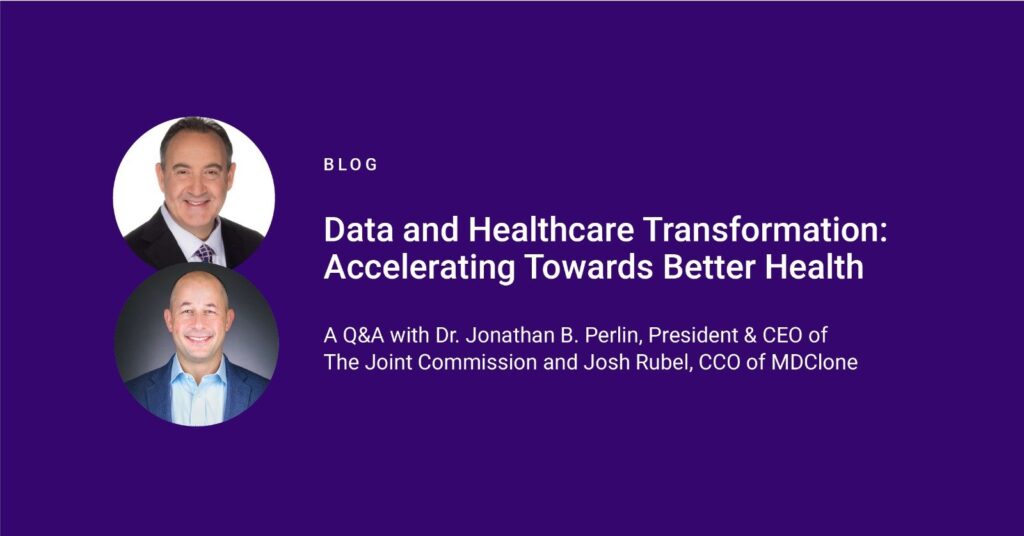The constant across all healthcare organizational change is system transformation through information — making data more accessible, more explorable, and ultimately more actionable.
At Reuters Total Health conference in Chicago, Josh Rubel, CCO of MDClone had the opportunity to co-present on this topic with Jonathan B. Perlin, M.D., Ph.D., M.S.H.A., M.A.C.P., F.A.C.M.I., President & Chief Executive Officer of The Joint Commission. The conversation focused on the trends, opportunities, barriers, and structures that allow transformation to take place within the healthcare sector.
“Many technologies are focusing on the bespoke nature of the sorts of analysis. We don’t know what questions people are going to ask tomorrow, but we know they’re going to ask many questions. And there’s always a follow up and another follow up.””
The reality is, when caring for patients (COVID-19 is a great example) the requirement associated with refining the questions you’re asking is necessary so that you can care for the patients that show up tomorrow. But there’s a big problem with predictive questioning. Professionals in the industry all need to be curious and take action in order to scale.
“Health information is the currency of healthcare. This is nothing new, but the truth is, other currencies are no longer acceptable. Whether it is information supporting a healthcare provider, or researcher, or for a performance evaluation, the best data is a mashup of traditional and non-traditional sources.””
Rubel: How promising is the transformation and the use of healthcare data?
Perlin: There is so much promise. It is the capacity to go to scale and to accomplish what we have intended but have not necessarily been able to accomplish prior. To go to scale on equity, for example, we need to bring in social determinants data. To bring in this data, we need to reach outside of electronic medical records (EMRs) and be able to combine that information with clinical data to be as effective as possible.
Finding information in the data is a big challenge. The problem is establishing the pattern of data and unlocking its potential. That potential is the key to shortening the cycle of research and proactively taking better care of patients.
One of the frustrations the industry sees collectively is that we haven’t been able to get the information out of the EMR. How many transformative answers exist within the data that we’ve already created? The real opportunity is how we harvest that information to reap the data dividend and the return on information.
Rubel: Expertise, time, and tools are required to make data driven transformation a reality. What should we expect in the future to accelerate this new reality?
Perlin: Historically, we have been scaling by brute force and use of labor but have not always been scaling systematically.
Before joining The Joint Commission, my previous position was as President, Clinical Operations, and Chief Medical Officer at HCA Healthcare. By October 2020, HCA had collected more data on COVID patients than any other healthcare organization, potentially in the world. Holding this information, we asked ourselves, “Is there something we can do to share data with others to accelerate the understanding of COVID and its treatment more quickly?”
We were able to answer many questions – but only those questions that we anticipated the captured data elements might answer. That’s useful, but the real power of going to scale is having a system where the data flows through the EMR system, and data from other sources goes into an integration engine that allows users to not only answer questions that are anticipated, but also answers questions that were not anticipated. It is at this point when, I believe the magic happens.
Rubel: What gets in the way when health systems try to go through this journey of data exploration?
Perlin: People, process, and technology – and money is a subset of all three of those. In terms of people, we need to reskill and upskill from business analytics to data science. We need to not just focus on descriptive and diagnostic but to go up the hierarchy to predictive, prescriptive, and autonomous. In terms of process, we need to increase the automation and make use of clouds to bring information together in different ways. And with technology – it all can be scaled.
Forward-looking, data alone is not enough. Making all clinicians, physicians, providers, and healthcare workers into users of data will allow for a more predictive future.
From business analytics to data sciences, from insights to action for transformation because data is inert, data exploration must include those processes to find its value and the technology for scalable disruptive actionability.
“Implementing the right technology and empowering clinicians and researchers to embrace data within their workflow can impact healthcare organizations exponentially,” said Rubel. “With the right infrastructure in place, data can be put into action to truly transform healthcare.”
How are you putting data into action and transforming healthcare?
What roadblocks are difficult to overcome in regard to data access and analysis?
Innovation is only a question away.
Learn more →
Submit your questions about data privacy and data exploration here or connect with Josh Rubel to further the conversation.
Special thanks to Dr. Jonathan B. Perlin, President & Chief Executive Officer, The Joint Commission, for joining MDClone on stage and at the Reuters event. Your expertise, leadership, and insights were invaluable to our team.










